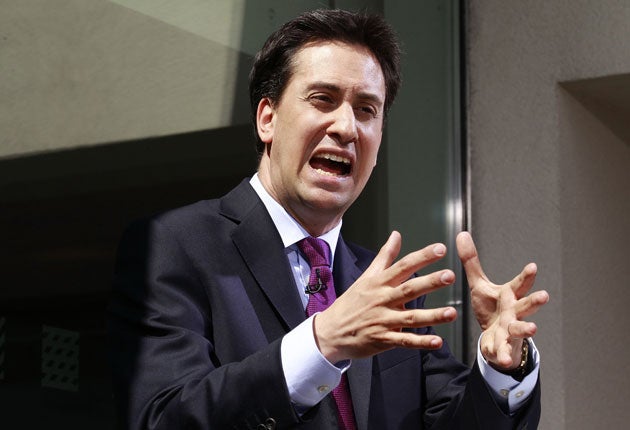Andrew Grice: Miliband needs to find a voice fast if he wants to be heard
Inside Westminster

When Ed Miliband pronounced New Labour "dead" on winning the party leadership last September, he was trying to signal a new style of politics rather talking about the substance of policy.
He was also sending a message that, under his management, Labour would finally move on from the debilitating Blair-Brown rivalry which scarred Tony Blair's 13 years as leader.
As he struggles to establish himself in the public's eyes, Mr Miliband needed yesterday's revelations about an alleged plot by Brownites to oust Mr Blair after the 2005 general election like a hole in the head.
So far, the leaked private papers belonging to the shadow chancellor Ed Balls contain no "smoking gun" about the involvement of Mr Miliband or Mr Balls in the efforts to prise Labour's most electorally successful leader out of Downing Street. And the "plot" was hardly secret since Mr Blair had declared before the 2005 election that it would be his last as Labour leader.
The manoeuvring by the Brown camp was designed to get him out as soon as possible. Mr Blair, who felt at his boldest and most decisive in his curtailed third term as his time ran out, wanted to hang on until 2008 to complete as many domestic reforms as possible.
In fact, Mr Brown had been nagging him to stand down since soon after the 2001 election ("When are you going to fuck off?", he would ask), believing this was part of their 1994 pact under which Mr Blair became the modernisers' leadership candidate.
By 2005, the then-Chancellor was getting desperate and feared that, the longer Mr Blair clung on, the less chance Mr Brown would have of making his mark as prime minister and winning the following election.
Mr Miliband's allies may describe the papers as "ancient history" but they are not that ancient. Many voters are not listening to Labour. The leaked documents may only reinforce the impression of a party more interested in its internal machinations and personal rivalries than the country's future. That may be their real significance. "It's one step forward, one step back for us at the moment," one shadow cabinet member groaned yesterday.
Even before yesterday's leak, Mr Miliband was finding it hard to be heard. Labour looks more like a third party – a feeling the Liberal Democrats know well – rather than an alternative government. Some former ministers are finding the slog of opposition hard. You have to shout loud to be heard. On Tuesday, Mr Miliband had hoped to make waves by calling a press conference at which he offered all-party talks on the important issue of social care. His inner circle spent many hours planning the initiative. Yet his big announcement became a footnote to David Cameron's speech about the Government's NHS reforms.
On the face of it, the inclusion of the Liberal Democrats in the Coalition should make it easier for Labour to be the alternative voice to the Government. True, it has scooped up 70,000 new members since last year's election and added about 10 points in the opinion polls as left-of-centre voters who feel betrayed desert the Liberal Democrats.
But sensible Labour folk are worried about what they describe as the party's "mediocre" performance in the south of England in last month's council elections. And they grumble that Labour's unexpected disaster in the Scottish Parliament elections shows the dangers of relying on an opinion poll lead holding firm and assuming Lib Dem defectors will all come over to Labour.
"We need to appeal to Tory supporters" is a cry you hear a lot from Blairites who moan privately about Mr Miliband. They are not plotting against him and do not want to undermine him, not least because a return to the internecine war of the Blair-Brown era can only make it even harder for Labour to win in 2015.
But Mr Miliband is determined to do things his way and his own time. That does not mean waiting until the 2015 election. He has a plan and is not going to be pushed off it. He is not relying on former Lib Dem supporters to carry him to power. He is confident we will know much more about his project by the time he marks a year as leader at this autumn's Labour conference.
The Labour leader is not interested in spin, photocalls and gimmicks. He intends to convince voters that his party is changing fundamentally. He is not ruffled by unflattering comparisons with the early months of the Blair and Cameron leaderships.
Mr Blair dumped Labour's Clause IV commitment to public ownership. Mr Cameron hugged a husky in the Arctic. "Cameron may have followed the Blair playbook, but he didn't win the election," one Miliband ally insisted. "The world has moved on. People want substance, not images."
Yet Mr Miliband's internal critics worry that voters form a judgement about party leaders quickly, and that first impressions are hard to shift. If people can't soon imagine him passing the "No 10 doorstep test", they may never do so. "Ed knows what he needs to do," one senior Labour figure said. "It's time he got on with it."

Join our commenting forum
Join thought-provoking conversations, follow other Independent readers and see their replies